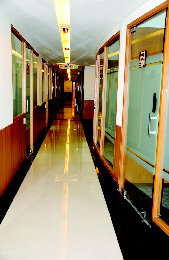
The idea of sharing office space and having virtual office addresses has been quite popular abroad, but this concept has not been explored much in India. However, the current slowdown in the economy, and arrival of MNCs in cities like Gurgaon is slowly changing the way we look at office and the workspace. With large corporates looking to rightsize, due to the current economic scenario, and startups not having funds to splurge on anything except their core competence, the emerging trend in the City is to rent dedicated serviced spaces in business centres and opt for virtual addresses, which come at a fraction of the cost of the real thing. Real estate experts suggest that if someone is looking for less than 3000 sq feet at a good business address then they should rent space in a serviced business centre. In fact it is difficult to rent smaller offices in Gurgaon in prime commercial locations such as DLF Cyber City, as builders prefer to offer large areas for lease.
Mona Shukla, who has been a pioneer in the Managed-Office industry in the country, says that the idea of virtual offices and shared spaces will get more traction not only in Gurgaon but across the country, as people have come to realise that it can help them save money, while boosting productivity. “In 2005, when I launched the shared office concept in India on behalf of a multinational, it was a very new concept. I had to explain the nitty-gritties to customers,” says Shukla. However, the industry has come a long way since then, and Gurgaon has almost 10 top quality business centres that offer shared space and virtual offices. A dedicated or shared office space comprises flexible workspaces at good locations in quality business districts. These spaces are managed by a company that runs the business centre and takes cares of service, infrastructure and logistics. Shukla, who runs the Corporatedge Business Centre at the prestigious Building No. 5 in DLF Cyber City has 17000 sq feet available, wherein 42 suites have been created. “The Suites can be customized as per the demands of the users. We offer quality furniture and fixtures, high speed internet, telephony, reception services, pantry and cafeterias - all included in the cost,” says Shukla. A large number of multi-national companies as well as start-ups in Gurgaon are opting for these office options because businesses these days want to outsource their non-core activities. The cost of a dedicated workspace for a few people start-up one of the best business addresses in the City could come anywhere between Rs 25000 to 35000 per month - depending on location, building, quality of service and availability of common areas. The office users can also rent the conference room, use video-conferencing tools as well as hire meeting rooms (say, to interview people) for a small add-on cost. Even ‘outsiders’ can use these facilities though the cost for them is, naturally, higher.
Along with the office space the idea of virtual offices has also been embraced, as a large number of corporate employees have become entrepreneurs. Prasoon Kumar, AGM of the AIPL Business Centre on the Golf Course Road, says that this idea has caught up in the City. “We have a large number of people opting for virtual offices as these come at a low cost. This helps the start-ups as well as organizations that do not need huge dedicated 24x7 physical space; and they also benefit from a professional address that adds to their brand value,” says Kumar. The AIPL Virtual Office offers multiple services to the customers - including a professional business address, dedicated telephone number, personalized call answering, call forwarding/patching, 24 hours voice mail retrieval, mail collection, prompt notification, administrative support - and also limited hours of physical office space in a month. However, customers at the AIPL Centre cannot use this address as a registered office. In this regard, Shukla’s Business Centre offers the facility of even using their address as a registered office. Another important aspect of the shared office centres in Gurgaon is that operators prefer to rent the space to professionals, corporates and budding entrepreneurs. “We prefer people with a professional background. The shared space also puts some limitations, as people prefer ‘sharers’ with similar profiles and needs,” says Kumar. Another interesting point made by industry experts is that the trend of using homes or coffee shops as work and meeting places is also on the wane, as these places have more distractions and disturbances. Amit, who used to operate his software business from a coffee shop, says that there were too many people lazing around, which reduced productivity. “There is also the issue of a business address; so I preferred to rent a workstation in a shared business centre,” he says. Seema Agarwal, who offers a shared workstations in Spaze IT Park, says that not only is the cost of renting such a space low, but it also offers a great opportunity to network with like-minded professionals from various fields, and helps expand one’s business horizon and skills.



That the idea of serviced offices has come of age is indicated by the fact that the Federation of Apartment Owners Association (FAOA), which is an umbrella RWA body, has rented space in the AIPL Business Centre. Rama Murthy, a functionary of FAOA, says that it is better for small organizations to opt for serviced offices because it allows them to focus on their core job rather than ‘waste’ money and resources on managing an office. “By renting this space we don’t need to hire an office boy and there is no hassle of setting up of phones, Internet and other such facilities. We just have to come here for work, and the rest (everything) is taken care of,” he says. Murthy is very fond of the business lounge and cafeteria, which are offered as part of the deal. “We can have meetings in the lounge, which is well-appointed, and also have beverages, which is not possible in an owned office - as it is difficult to have a pantry,” he says.
The current business scenario, which is verging on being dismal, is likely to further give a boost to the shared and virtual space in the City. Shukla of Corporatedge says that MNCs who want to downsize are looking at shared space, and paradoxically even those who want to expand are also being conservative and evaluating such centres. “The start-up space is hotting up in Gurgaon, and it will keep on expanding, thus boosting the shared office space industry,” she says. It is perhaps because of these opportunities that multinationals like Regus and Indian builders like Vatika have expanded their footprint in the shared as well as virtual office space in the City. Regus, a pioneer in this space, offers business centres, office space, day offices, mobile working, part time offices, incubation space and hot desking as part of its portfolio. The Company also offers conference and meeting rooms to customers on terms that are very flexible and cost-effective. However, the entry of builders into the serviced office space does not enthuse industry veterans, who feel that a background in hospitality, and service orientation, is essential to successfully run this business. “Many times people rent space in not-so-professionally-run business centres and later suffer the consequences. It is advisable to rent space in offices that have reputation, even if these come at a higher cost,” says Shukla. The shared office space has in fact become so dynamic that some companies are even trying to monetise their idle working space and stations, by sharing it with outsiders. Even office supplies and facilities such as printers, projectors and coffee machines are being rented to outsiders.
Doing something on the same lines, but with a difference, is entrepreneur Seema Agarwal, who offers shared workstation space to young entrepreneurs for Rs. 6,500 per seat per person in Spaze IT Park on Sohna Road. Agarwal says that she wants to incubate young talent and help them in achieving their entrepreneurial dreams. “We built this office for our son’s company, but since he required only one cabin we decided to convert this space into a business centre. We prefer to rent space to professionals who are working in IT and Consultancy; we do not want property dealers,” she says. Agarwal also wants to invite women entrepreneurs and support them by offering a heavy discount. “Women entrepreneurs are most welcome,” she says. At her business centre, workstations have mainly been rented out by single individuals, though some of them have graduated to a larger staff. “The shared space is cost effective for young entrepreneurs as they don’t have to worry about rent and office expenses. This trend is fast catching up in Gurgaon, and I am very satisfied with the manner in which my business has grown”, she says. K.K Puri, who works as a freelance Consultant, is satisfied working at Agarwal’s shared and services office space, as he is able to work in a professional environment without the hassles of running an office and staff. Since he lives nearby he also walks to his home every afternoon to enjoy the piping hot lunch, and returns leisurely to his air-conditioned office workstation, which he knows will be safe and secure in his absence. The 24-hour back up and security is a bonus for a senior citizen like Puri.
While there are many votaries for the shared and virtual office concept, a few real estate experts also opine that there are hidden drawbacks, and scalability is a big issue. Sanjay Sharma, MD Qubrex, opines that if the space is for short-term usage then it is effective, but for longer periods and large teams other options should be looked at. “There is also the issue that people who have invested in these shared offices are often hoodwinked by builders, as there is nothing physical owned by them in these offices,” he reveals. However, Property Consultant Pankaj Tomar feels that these solutions are a great opportunity for people who cannot afford to buy or rent large offices, and need an address. “These are ideal for big companies to make a move into a new city like Gurgaon, as a small team of 4 to 5 people can initially set up base here. They can later move to a large place once the scaling-up happens,” says Tomar, who has witnessed several such deals in the City.
Ramamurthy of FAOA, a Chartered Accountant by profession, opines that in the current business scenario companies are looking to bring in efficiencies. “A lot of companies, especially in the services sector, don’t want to invest in real estate. Even MNCs are outsourcing non-core jobs and want experts to manage infrastructure and services,” he says. With tough economic conditions putting pressure on profits, every industry wants to safeguard its margins, and having less expense on non-core jobs is a worthwhile saving. The increasing switch to shared and virtual offices indicates that Gurgaon is already adapting to the tough but new reality of low growth – which also tends to emphasise costs that were not taken seriously in a high growth environment.
Read More...